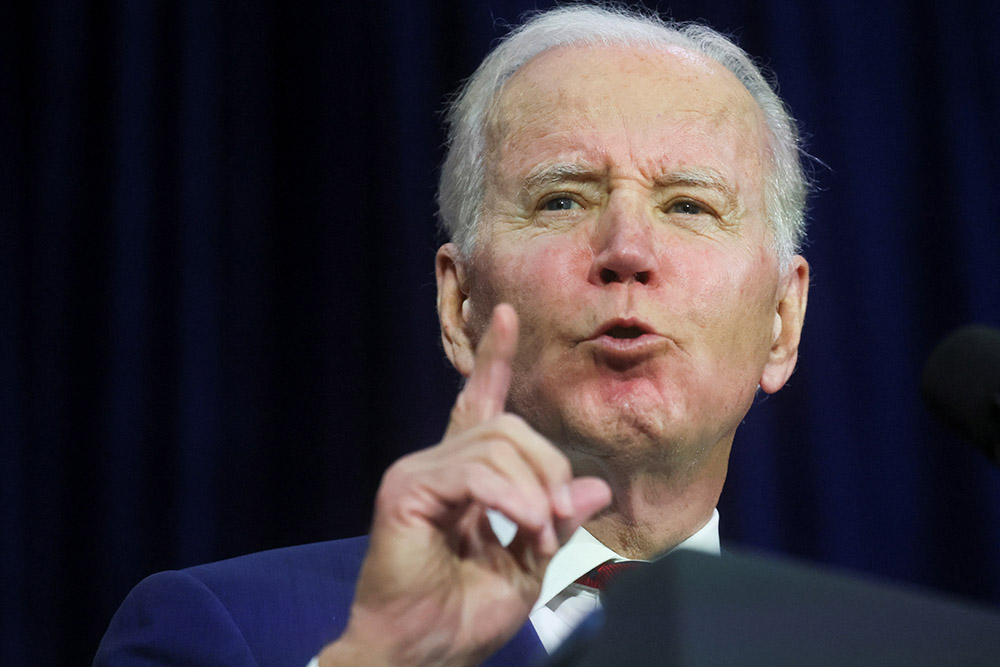
By Kate Scanlon
WASHINGTON (OSV News) — While President Joe Biden is “very sincere” about his Catholic faith, “there are things that he chooses to ignore,” Washington Cardinal Wilton D. Gregory said in an interview March 31.
During a discussion on Easter on “Face the Nation” on CBS News, host Ed O’Keefe said, “Cardinal, I appreciate that there’s a reluctance to speak about any one specific Catholic, especially one that you’ve worshipped with. But in the case of the president, do you get a sense that his regular attendance and adherence to the faith resonates with American Catholics?”
“I would say that he’s very sincere about his faith,” Cardinal Gregory replied. “But like a number of Catholics, he picks and chooses dimensions of the faith to highlight while ignoring or even contradicting other parts. There is a phrase that we have used in the past — a ‘cafeteria Catholic’: You choose that which is attractive, and dismiss that which is challenging.”
Pressed by O’Keefe if there was “something on the menu (Biden is) not ordering,” Gregory replied, “Well, I would say there are things, especially in terms of the life issues, there are things that he chooses to ignore, or he uses the current situation as a political pawn rather than saying, ‘Look, my church believes this. I’m a good Catholic, I would like to believe this.’ Rather than to twist and turn some dimensions of the faith as a political advantage.”
Biden, who is the nation’s second Catholic president and who regularly attends Mass, faces criticism from some Catholics and clergy for his public position on abortion, including his call for Congress to pass the Women’s Health Protection Act, legislation that would prohibit restrictions on abortion prior to viability.
The Catholic Church opposes abortion, outlining its teaching in the Catechism of the Catholic Church that human life “must be respected and protected absolutely from the moment of conception.” Because abortion takes the life of an already conceived child, it is “gravely contrary to the moral law.”
At the same time, Catholic leaders have called for policies and actions to support women and families facing unplanned pregnancies. The U.S. bishops have called on Catholic parishes to join the “Walking with Moms in Need” initiative and have advocated for changes to the U.S. child tax credit so that mothers could retroactively apply the credit to the tax year they were pregnant prior to giving birth.
Episcopal Bishop Mariann Budde of Washington, also a panelist in the discussion, argued that it is “possible to be a practitioner of the faith as a public leader, and not require everyone that you lead in your country to be guided by all of the precepts of your faith.”
But Cardinal Gregory replied affirmatively when O’Keefe asked him if Biden “??should be more explicit in his own personal belief” on the topic.
“He does attend church regularly with great devotion,” Cardinal Gregory said. “But he also steps aside (on) some of the hot-button issues, or uses the hot-button issues as a political tool. Which it’s not, it’s not the way, I think, we would want our faith to be used. The issues of life begin at the very beginning. And they conclude at natural death. And you can’t, you can’t pick and choose. You’re either one who respects life in all of its dimensions. Or you have to step aside and say, ‘I’m not pro-life.'”
The pair also discussed the aftereffects of the COVID-19 pandemic on American spiritual life, fostering interfaith dialogue, and how they counsel their flocks in difficult times. O’Keefe asked the pair what they say to the faithful when “it seems the world is on fire.”
Cardinal Gregory said, “The Easter mystery is dependent on the experience of Good Friday.”
“The reason that Easter becomes so pivotal is that it has overcome the hatred, the violence, that Jesus suffered, and (he) rose above it.”
Budde said Jesus’ example is, “I will go where the pain is, and I will be with you there.”
O’Keefe also asked Cardinal Gregory how Pope Francis is doing after suggesting he appeared to be “struggling this week with some of his Holy Week obligations.”
“Well, I think for a man who’s 87, he has good days and bad days. And … if I’m given the grace to reach that age, I suspect I will have good days and bad days,” Cardinal Gregory said, adding, “he’s exhibiting the health issues that a man of his age would have.”
“What we do, unfortunately, is that we focus on one dimension: ‘Oh, he’s had a bad day,'” the cardinal said. “Well, let me sign up for a bad day every once in a while because they do happen.”
